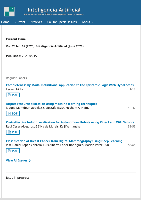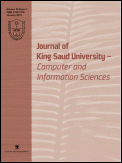
ADCAIJ-Advances in Distributed Computing and Artificial Intelligence Journal
Scope & Guideline
Advancing the Frontiers of Distributed Computing and AI
Introduction
Aims and Scopes
- Distributed Computing Techniques:
Research on algorithms and frameworks for distributed systems, exploring their performance, scalability, and reliability in various applications. - Artificial Intelligence Applications:
Studies that demonstrate the application of AI methodologies in diverse fields such as healthcare, finance, and social media analysis. - Machine Learning and Deep Learning:
Focus on the development and evaluation of machine learning and deep learning algorithms, including novel architectures and optimization techniques. - Blockchain Integration:
Exploration of blockchain technology's role in securing and optimizing distributed systems, particularly in big data and healthcare. - Healthcare Informatics:
Investigations into the utilization of computing and AI technologies to improve healthcare outcomes, diagnostics, and decision-making processes. - Natural Language Processing and Sentiment Analysis:
Research on text processing, sentiment analysis, and the application of NLP techniques across various contexts, including social media. - Computer Vision Technologies:
Development of innovative computer vision methods and applications, particularly in areas such as object detection and medical imaging.
Trending and Emerging
- Healthcare AI Solutions:
An increasing number of studies focus on AI applications in healthcare, particularly in diagnostics and clinical decision support, reflecting the growing intersection of technology and medicine. - Integration of Blockchain with AI:
Research exploring the synergy between blockchain technology and AI is on the rise, particularly in enhancing data security and integrity in distributed systems. - Enhanced Natural Language Processing Techniques:
Emerging trends in advanced NLP methods, including sentiment analysis and text classification, show a growing interest in understanding human language through computational techniques. - Robotics and Automation:
The journal has seen a rise in publications related to robotics, particularly those integrating computer vision for enhanced automation and object handling. - Big Data Analytics:
Papers focusing on the extraction and analysis of big data using distributed computing frameworks are increasingly prevalent, reflecting the demand for effective data processing solutions. - Energy Efficiency in Computing:
There is a notable trend towards research on energy-efficient computing solutions, particularly in the context of distributed networks and sensor systems.
Declining or Waning
- Traditional Computing Paradigms:
Research focusing on conventional computing methods has diminished as the field shifts towards more advanced distributed and AI-driven approaches. - Basic Algorithm Comparisons:
Papers centered on simple comparisons of algorithms without novel contributions have decreased, indicating a preference for innovative applications and hybrid methodologies. - Low-Level Hardware Interfacing:
Publications dealing with low-level hardware interfacing are becoming less frequent, as the focus moves towards higher-level abstractions and software-driven solutions. - Generalized Surveys without Novel Insights:
The trend of publishing generalized survey papers that do not offer new insights or methodologies has waned, with a stronger emphasis on original research contributions.
Similar Journals

Frontiers in Artificial Intelligence
Connecting Minds in the Realm of AIFrontiers in Artificial Intelligence, published by FRONTIERS MEDIA SA, is a pioneering open-access journal that commenced in 2018, dedicated to advancing the multifaceted field of artificial intelligence. With an impressive Q2 ranking in the category of Artificial Intelligence, it occupies a significant position within the academic community, offering a platform for high-quality, peer-reviewed research. The journal's comprehensive scope encompasses a variety of subfields, including machine learning, robotics, and human-computer interaction, making it an invaluable resource for researchers, professionals, and students alike. As an open-access journal since 2019, it ensures that cutting-edge research is readily available to a global audience, facilitating knowledge sharing and collaboration. With its headquarters in Switzerland and a commitment to scholarly excellence, Frontiers in Artificial Intelligence is at the forefront of the scientific discourse, empowering the next generation of innovations in AI.

International Arab Journal of Information Technology
Advancing Knowledge in Information TechnologyWelcome to the International Arab Journal of Information Technology, a prestigious publication under the aegis of ZARKA PRIVATE UNIVERSITY in Jordan, dedicated to advancing the field of Information Technology. First established in 2008, this journal has made significant strides in disseminating high-quality research, achieving an impressive Q2 ranking in Computer Science (miscellaneous) and securing a notable 57th percentile position in the Scopus rankings. With a comprehensive scope encompassing various sub-disciplines of computer science, the journal is committed to promoting scholarly dialogue and innovation among researchers, professionals, and students. While currently operating as a subscription-only journal, it remains a vital resource for the academic community seeking to explore the latest trends and advancements in technology. The International Arab Journal of Information Technology is not only a platform for original research but also a vibrant hub for ideas that shape the technological landscape of the Arab region and beyond.

Inteligencia Artificial-Iberoamerical Journal of Artificial Intelligence
Catalyzing Progress in Ibero-American AI Studies.Inteligencia Artificial-Iberoamerican Journal of Artificial Intelligence, published by the ASOC ESPANOLA INTELIGENCIA ARTIFICIAL, serves as a pivotal platform for disseminating cutting-edge research in the burgeoning fields of artificial intelligence and software development. Established in 1997 as an Open Access journal, it ensures broad accessibility to its scholarly content, thus fostering collaboration and knowledge exchange amongst researchers, professionals, and students across the globe. Based in Valencia, Spain, the journal currently operates within a significant timeline spanning from 2004 to 2010 and 2012 to 2024, enabling continual contributions to the academic discourse. Although it holds a Q4 quartile ranking in both the Artificial Intelligence and Software categories and a notable yet competitive Scopus ranking among its peers, the journal remains committed to advancing the understanding and application of sophisticated AI methodologies. As it continues to embrace innovative research, this journal stands as a crucial reference point for those keenly navigating the complexities of artificial intelligence in a rapidly evolving digital landscape.

Cluster Computing-The Journal of Networks Software Tools and Applications
Transforming Technology through Insightful ResearchCluster Computing - The Journal of Networks Software Tools and Applications, published by Springer, is a premier academic journal catering to the vibrant fields of computer networks and software technologies. With an impressive impact factor and recognized as a Q1 journal in both Computer Networks and Communications and Software categories for 2023, it ranks within the top echelons of its field, boasting a Scopus rank of #50 out of 395 and #59 out of 407 respectively, highlighting its influence and reach. The journal, which has been in continuous publication since 2005, serves as a vital platform for groundbreaking research, offering insightful articles and tools that drive innovation in network computing. Researchers, professionals, and students are invited to contribute to and benefit from the dynamic discourse presented in this journal, which is pivotal for advancing knowledge and enhancing practical applications in a rapidly evolving technological landscape.

Visual Computing for Industry Biomedicine and Art
Championing Open Access Research in Visual Computing ExcellenceVisual Computing for Industry Biomedicine and Art, published by SPRINGER SINGAPORE PTE LTD, is an esteemed Open Access journal that has made significant contributions to its fields since its inception in 2018. With an impressive scope that intersects Computer Graphics, Computer Science, Medicine, and the Visual Arts, this journal serves as a pivotal platform for disseminating research and advancements that address contemporary challenges and innovations in visual computing. Notably, it holds a commendable standing in various Scopus rankings, achieving Q2 status in critical categories such as Computer Vision and Pattern Recognition and Visual Arts, which underscores its impact and reach within the academic community. Its promulgation of high-quality research fosters synergy between diverse disciplines, making it an invaluable resource for researchers, professionals, and students eager to engage with cutting-edge developments in both technology and the arts. The journal's commitment to accessible knowledge, evident through its Open Access offering, further enhances its role as a beacon for scholarly discourse in visual computing.

Service Oriented Computing and Applications
Navigating the Landscape of Computing ExcellenceService Oriented Computing and Applications is an esteemed journal published by SPRINGERNATURE, focusing on the rapidly evolving domains of service-oriented computing and its myriad applications. With an ISSN of 1863-2386 and an E-ISSN of 1863-2394, this journal has an impressive track record since its inception in 2007, converging with significant contributions from researchers and professionals through 2024. This journal stands out in the academic landscape, evidenced by its categorization in Q2 across multiple fields, including Hardware and Architecture, Information Systems, Management Information Systems, and Software, as per the latest 2023 metrics. Although it does not currently offer Open Access options, its relevance in Computer Science, Business Management, and integrated technology makes it a valuable resource for scholars and practitioners alike, aiming to explore the intersection of computing technologies and their application in real-world scenarios. The journal's rankings in Scopus provide further testament to its impact and importance, making it a key publication for anyone looking to stay at the forefront of advancements in service-oriented computing.

Journal of Grid Computing
Fostering Excellence in Grid Computing ResearchThe Journal of Grid Computing, published by Springer, stands as a pivotal resource in the dynamic field of computer science, particularly within the realms of Computer Networks and Communications, Hardware and Architecture, Information Systems, and Software. With an impressive Q1 ranking across these categories in 2023, the journal exemplifies excellence and rigor, catering to a diverse readership from researchers to industry professionals. Established in 2003, this esteemed journal is anchored in the Netherlands and releases cutting-edge research that reflects trends and advancements in grid computing technologies. Researchers can gain insights through its vast contributions, while institutions benefit from its prestigious standing within the SCOPUS framework, boasting high percentile ranks in multiple computer science categories. Though not open access, the journal provides unparalleled access options for institutional subscribers, solidifying its importance as a gateway to innovative discoveries in high-performance distributed computing.

Journal of King Saud University-Computer and Information Sciences
Advancing Knowledge in Computer Science and ITJournal of King Saud University-Computer and Information Sciences, published by ELSEVIER, is a prestigious open-access journal focusing on the rapidly evolving fields of computer science and information technology. Since its inception in 1996, this journal has provided a platform for high-quality research and innovative ideas, promoting the dissemination of knowledge to a global audience. With a remarkable impact factor and ranked Q1 in the Computer Science (miscellaneous) category as of 2023, it stands among the top 11% of journals in its field, reflecting its commitment to excellence and relevance. The journal proudly carries the ISSN 1319-1578 and E-ISSN 2213-1248, and it is based in Saudi Arabia while being part of a global academic network. With a Scopus rank of #26 out of 232 in general computer science, the Journal of King Saud University-Computer and Information Sciences is an essential resource for researchers, professionals, and students seeking to stay at the forefront of technological advancement. As it continues to thrive through 2024, it invites contributions that will shape the future of computing and information sciences.

Data Intelligence
Empowering Insights Through Open Access ResearchData Intelligence, published by MIT PRESS, is an influential open-access journal dedicated to advancing knowledge within the intersecting fields of Artificial Intelligence, Computer Science Applications, and Information Systems. Since its inception in 2019, it has rapidly established itself as a leading academic platform, achieving impressive rankings—including Q2 in its principal categories for 2023—demonstrating its impact and relevance in these dynamic fields. With an E-ISSN of 2641-435X, Data Intelligence aims to bridge theoretical research and practical applications, providing a venue for scholars and practitioners to disseminate innovative research and ideas. The journal's commitment to open access ensures that cutting-edge research is accessible to a broad audience, fostering collaboration and knowledge sharing among the global community of researchers, professionals, and students. Located in Cambridge, MA, Data Intelligence continues to pave the way for transformative insights in the realm of data-driven technologies through its rigorous peer-reviewed content and a wide array of interdisciplinary perspectives.

Internet of Things
Charting New Territories in IoT ResearchInternet of Things is a cutting-edge academic journal dedicated to the rapidly evolving field of interconnected devices and systems, published by Elsevier. Established in 2018, this journal has quickly ascended to prominence, achieving Q1 rankings across multiple disciplines including Artificial Intelligence, Computer Science Applications, and Engineering in its 2023 assessments. With its ISSN 2543-1536 and E-ISSN 2542-6605, it serves as a pivotal platform for researchers and professionals alike to disseminate innovative research findings, case studies, and reviews that address the complexities and opportunities within the IoT landscape. The journal’s impressive Scopus rankings further underline its significance, with notable placements in highly competitive categories. Although it operates under traditional publishing models, ensuring thorough peer review and academic rigor, Internet of Things remains at the forefront of technological discourse, facilitating knowledge exchange and collaboration among its audience. For those engaged in the dynamic fields of technology and innovation, this journal is an essential resource for up-to-date research and practical insights.